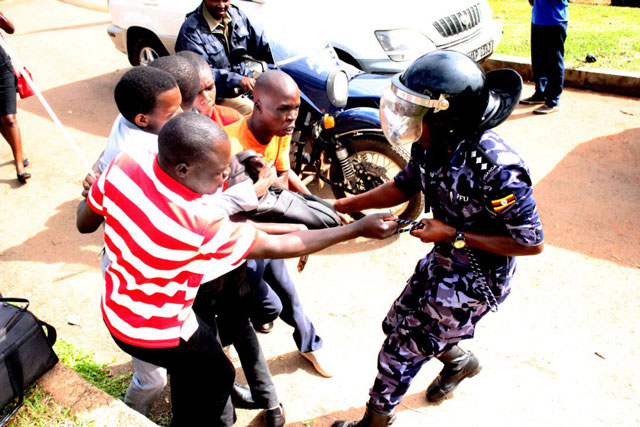
Kampala, Uganda | THE INDEPENDENT | Staff Associations at Makerere University have described the recent night crackdown, and break into student’s rooms, at the institution as a sad commentary in its history.
The staff leaders said that both the students and staff of Makerere University deserve better treatment, fair hearing and constructive engagement. This is contained in a statement addressed to the chairperson of council Lorna Magara, from the three staff associations.
The document was signed by Associate Professor Edward Nector Mwavu, the acting Makerere University Academic Staff Chairperson (MUASA), Bennet Magara, the head of the Makerere Senior Administrative Staff Association (MASA) and Bruce Twesigye, the support staff leader under their chapter body of National Union of Education Institutions (NUEI).
“…We strongly condemn… the vulgar, indispensable, horrendous, mistreatment of students, some members of staff and journalists. We strongly condemn those students who engaged in the destruction and vandalism of people’s property,” reads the statement in part.
The staff reaction arises out of the student’s standoff against the 15 per cent tuition increment which started on Tuesday, October 22, 2019.
The staff leaders observed that acts of highhandedness, brutality, intimidation, threats, suspensions and dismissals that are not preceded by meaningful dialogue, investigations and cautions, are only intended to subdue students and staff into submission and instil fear can only serve to undermine our output, academic freedoms and our standing in society.
The brutal arrest of students with disabilities by @PoliceUg at @MakerereU.
The Association of Students with Disabilities had organised a press conference to protest the brutality meted out a member of their association, journalist weren’t spared either.#FeesMustFall #Makerere pic.twitter.com/KSy2fSdteT— MALCOLM X’s STUDENT. (@GodwinTOKO) October 25, 2019
VIDEO: The Police stop a press conference where student leaders were talking about the Makerere University Raid last night by Police. The students claim that their colleagues with Disabilities were also severely beaten even though it was evident that they were disabled #NTVNews pic.twitter.com/KwJddVX7tX
— NTV UGANDA (@ntvuganda) October 25, 2019
They Also dismissed the narrative by the university managers that the students’ demonstration was politically motivated. They argue that once students and staff concerns are not internally addressed through meaningful and genuine dialogue, it invites third parties or a higher office to intervene.
Prof Ben Twinomugisha, from the Makerere School of Law, vowed not to step at the university in protest against what he termed as “the vulgar, despicable, horrendous mistreatment of students.” popularly known as Shokoro, Professor Twinomugisha said that what happened in Lumumba Hall is reminiscent of Amin soldiers’ brutal treatment of students and lecturers.
“Imagine your son or daughter in a room. Military thugs forcefully open the door, pull him or her out amidst beatings. Ladies and gentlemen, this militarization of all institutions, including the Ivory Tower, the citadel of higher learning, must be condemned by all people of a good conscience,” he said in a statement sent out to the staff WhatsApp forum.
He added that anyone pretending that the situation is normal is like the proverbial ostrich – hiding his or her head under the sand.
Makerere History don Mwambutsya Ndebesa acknowledged that Makerere University woes will not be solved unless the powers that be listen to divergent views. He said that the university has a governance crisis citing that the university Council which is the highest governance organ should be held accountable for the university crisis.
— Nabaye Tricia Gloria (@trishangloria) October 25, 2019
According to Ndebesa, Military can’t solve Makerere university issues. He however argues that there is need to break the tradition of students always g rioting as a pressure tool to address issues of a policy nature.
“You can actually strike without rioting and even disarm those who are craving to beat you. Secondary, students should also seek to target policy makers when striking over policy matters such as fees increment,” Ndebesa says.
He advises students to also come up with policy alternatives and seek to petition relevant authorities such as the university council, the Ministry of Education and parliament to address policy matters.
“The problem of fees increment is primarily a policy problem and secondary a management problem. You cannot resolve a policy issue by merely looking at management,” he adds.
****
URN
 The Independent Uganda: You get the Truth we Pay the Price
The Independent Uganda: You get the Truth we Pay the Price


